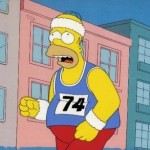It’s no secret that ingesting carbohydrates improves exercise performance, particularly that related to exercise intensity levels and endurance. If you’ve ever viewed a long distance running event, such as a marathon, or cycling event, you probably have seen the results of athletes who didn’t ingest sufficient carbohydrates. Such athletes “bonk” or “hit the wall,” the use the idiomatic terms applied to such events. They simply run out of gas, and begin to resemble a drunk stumbling out of a bar at closing time, as their thigh muscles begin to fail them. In 1966, Swedish scientists developed what was later called carbohydrate loading. This involved first a depletion, followed by a higher than usual intake of carbs in the week prior to competition. In more recent years, the carb depletion phase has largely been abandoned in favor of just temporary overtraining for about three days, followed by complete rest along with increased carbs for another three days up to the event. This results in supercompensation of muscle and liver glycogen stores. Glycogen is the form of carbohydrate stored in the body, and consists of branched chains of glucose that can readily be converted into glucose, the type of sugar that circulates in the blood. Glycogen constitutes the major fuel source for both extended exercise, such as workouts lasting over an hour, as well as long distance running or cycling,although the latter also uses fat as a fuel late in the race.
In workouts lasting one hour or less, glycogen depletion is less of a major cause of fatigue. The major causes of fatigue during shorter workouts involve a drop in creatine stores in muscle, along with increased metabolic acidity, and an increase in phosphate levels in muscle. This mainly applies to anaerobic exercise, as is typified by bodybuilding workouts. Such workouts often involve a higher intensity level compared to aerobic training. Glycogen stores are not the limiting factor in shorter, more intense workouts because such workouts don’t usually result in significant glycogen depletion. The situation changes, however, when initial glycogen stores are lower, as occurs during a very low carb diet (under 50 grams of carbs daily). In that scenario, the lack of stored muscle glycogen can limit exercise intensity levels at the start of the diet. After about two weeks, the body adjusts to using other fuels, such as ketones from fat metabolism, and the feelings or training fatigue diminish.
Despite the fact that glycogen isn’t a limiting fatigue factor for short workouts under an hour, various studies still show that ingesting carbs seems to boost training intensity even under shorter training session conditions. One study, for example, found a 10% increase in training intensity when 45 grams of carbs were ingested immediately prior to exercise compared to a placebo.This is hard to understand, since it takes time to absorb and digest the ingested carbs, so the question arises: what causes the apparent ergogenic effect provided by carbs right before a workout?
Studies have revealed an interesting effect of carbs that goes beyond its being the primary substrate for glycogen synthesis in the body. It turns out that carbs interact with taste receptors in the mouth that relay messages to certain regions of the brain. Among the regions of the brain affected by carbs in the mouth are those that are involved in muscle performance, as well as fatigue sensations. Here’s the kicker: this effect occurs when carbs are just swished in the mouth like mouthwash, but aren’t swallowed. When researchers substituted artificial sweeteners for carbs, no ergogenic effect occurred. One study compared actual ingestion of carbs prior to training with just swishing the carbs in the mouth without swallowing the carbs. Ingesting the carbs resulted in a 2.3% training performance increase, while swishing without swallowing led to a 2.8% improvement. Thus merely swishing carbs without swallowing them prior to a workout lasting 30 minutes to one hour will result in a significant increase in training intensity with less perceived fatigue. In short, you will be able to train harder. This does not apply to workouts lasting more than an hour, in which actually swallowing the carbs will be more effective. This technique only works with carbs, and I suspect that simple carbs would be better for this purpose than more complex carbs. This is good news for those who are on low carb diets. It means you can get some of the energy benefits of carbs before training without actually ingesting the carbs.
Jeukendrup A, et al. Oral carbohydrate sensing and exercise performance.Curr Opin Clin Nutr Care 2010: in press.
Tired of being ripped off by the latest and greatest scientifically tested, doctor approved, used for centuries, anabolic supplement? Learn the truth in my e-book, Natural Anabolics, at jerrybrainum.com.
tested, doctor approved, used for centuries, anabolic supplement? Learn the truth in my e-book, Natural Anabolics, at jerrybrainum.com.




















You must be logged in to post a comment Login